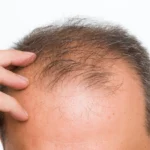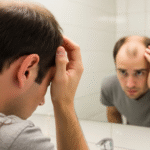Summary: Winstrol, a popular anabolic steroid, can cause hair loss due to its effect on DHT levels, which shrink hair follicles. Individuals genetically predisposed to hair thinning are at a higher risk. Winstrol and Hair Loss? Stopping the steroid can often halt further loss, but severe cases may require treatments like hair transplants. Preventive measures …
Summary:
Winstrol, a popular anabolic steroid, can cause hair loss due to its effect on DHT levels, which shrink hair follicles. Individuals genetically predisposed to hair thinning are at a higher risk. Winstrol and Hair Loss? Stopping the steroid can often halt further loss, but severe cases may require treatments like hair transplants. Preventive measures such as using DHT blockers and consulting a specialist can help reduce risks. If you’re concerned about hair health while using Winstrol, this article provides insights on how to protect your hair and make informed decisions.
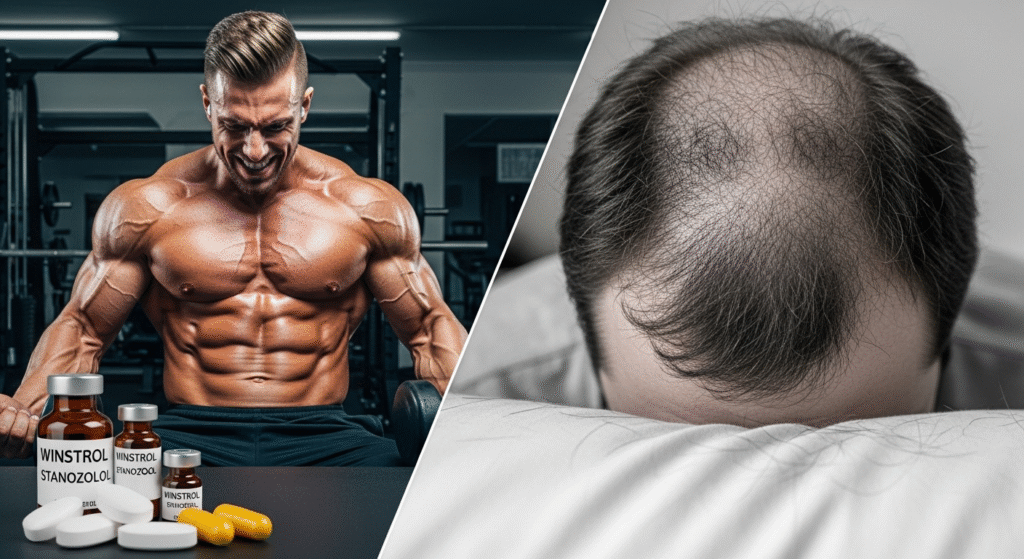
Table of Contents
Introduction:
Winstrol, a popular anabolic steroid, is often used by athletes and bodybuilders to enhance performance and build muscle mass. However, many individuals are unaware of its potential impact on hair health. If you’re concerned about hair loss while using Winstrol, it’s crucial to understand how it interacts with your body. This article will explain the connection between Winstrol and hair loss, the underlying causes, and provide expert-backed advice on how to protect your hair. Whether you’re using Winstrol for fitness goals or considering it, this guide will help you make informed decisions to minimize risks and maintain healthy hair.
What Is Winstrol and How Does It Work?
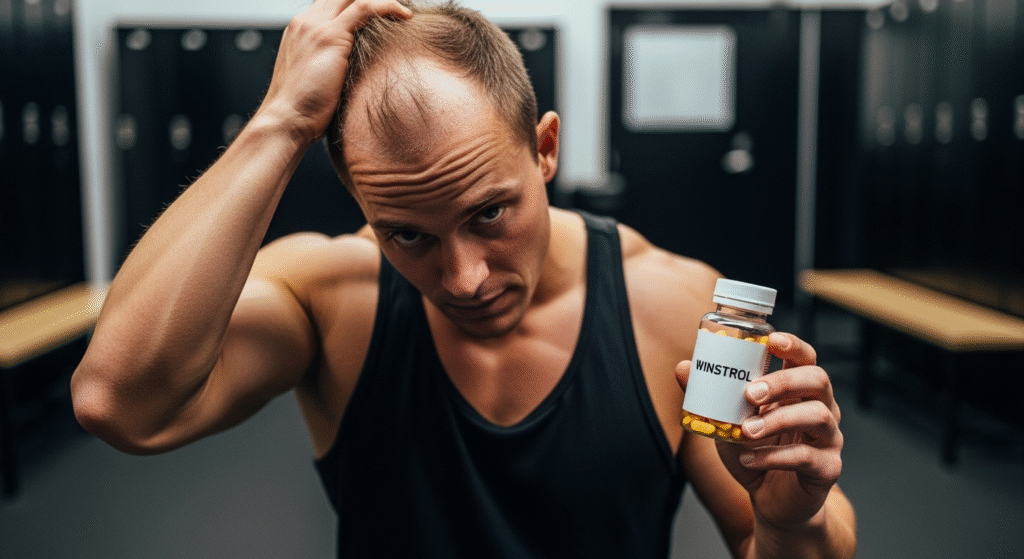
Winstrol (Stanozolol) is a synthetic anabolic steroid, commonly used to enhance physical performance and improve muscle definition. It’s favored by athletes and bodybuilders for its ability to increase strength and muscle mass without causing excessive water retention, which makes it a popular choice for cutting phases.
Winstrol works by mimicking the effects of testosterone in the body. However, while testosterone has numerous positive effects, such as muscle growth, it can also increase the levels of Dihydrotestosterone (DHT), a derivative of testosterone. This compound plays a significant role in hair thinning and hair loss, particularly in individuals genetically predisposed to androgenic alopecia (male or female pattern baldness).
How Does Winstrol Affect Hair Health?
Steroid use, particularly Winstrol, can lead to hair loss primarily through its conversion into DHT. DHT binds to androgen receptors in hair follicles, miniaturizing them over time and shortening the hair growth cycle. This process leads to hair thinning, shedding, and, in severe cases, baldness.
Individuals who are genetically predisposed to male pattern baldness (MPB) or female pattern hair loss (FPHL) are more likely to experience significant hair loss when using Winstrol. Even those with no family history of hair thinning may notice a slight change in hair volume after extended use of the steroid.
The Link Between Winstrol and Hair Loss
The primary connection between Winstrol and hair loss lies in its androgenic effects, which increase the production of DHT. As DHT levels rise, hair follicles begin to shrink, resulting in finer and shorter hair strands. Over time, the affected follicles may stop producing hair altogether.
The scalp is particularly sensitive to changes in DHT levels, and areas like the temples, crown, and frontal hairline are more prone to thinning due to DHT accumulation.
Who Is at Risk for Hair Loss with Winstrol?
While anyone using Winstrol may experience hair loss, individuals with a family history of hair thinning or baldness are at a significantly higher risk. Men are particularly prone to male pattern baldness, but women can also experience female pattern hair loss.
Other risk factors include:
- Age: Older individuals may already have thinning hair, making them more susceptible to steroid-induced hair loss.
- Pre-existing hair thinning: Those with existing hair issues are more likely to see rapid deterioration of hair density.
- Long-term use: The longer Winstrol is used, the higher the chances of noticeable hair thinning.
Understanding your risk factors before using steroids like Winstrol can help you make more informed decisions about your hair health.
Can Hair Loss from Winstrol Be Reversed?
One of the common questions about steroid-induced hair loss is whether the damage can be undone. If you notice hair thinning or loss while using Winstrol, the best course of action is to stop using the steroid. In many cases, discontinuing use can halt further hair loss and allow for some regrowth over time.
However, the extent of recovery can vary:
- Mild cases: Hair loss can be reversed in some individuals within a few months after stopping Winstrol.
- Severe cases: For those with significant hair thinning or bald spots, recovery may be limited, and additional treatments like hair transplants or medications (e.g., finasteride or minoxidil) may be necessary.
Hair growth may take several months, with noticeable results occurring around 3–6 months after discontinuing Winstrol.
How to Prevent Hair Loss While Using Winstrol
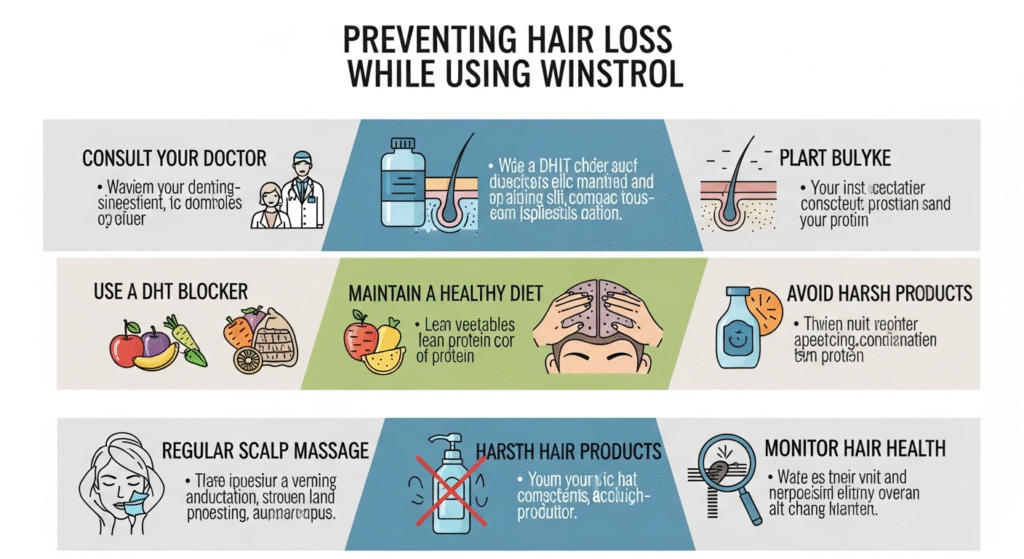
If you are using Winstrol and want to minimize hair loss, there are several strategies you can implement:
- Use DHT Blockers: Medications like finasteride can block the conversion of testosterone into DHT, helping protect hair follicles from damage.
- Hair Care Products: Opt for shampoos or topical treatments that promote hair health and strengthen hair follicles.
- Consult with a Specialist: Before using Winstrol, consult a dermatologist or hair specialist to assess your risk and explore possible preventive treatments.
- Use for Shorter Durations: If possible, limit the length of time you use Winstrol to minimize its impact on your hair health.
FAQs
How long does it take for Winstrol to cause hair loss?
Hair loss typically begins after several weeks of consistent use, especially for individuals already predisposed to hair thinning.
Can I prevent hair loss while using Winstrol?
Yes, using DHT blockers, changing your steroid regimen, and seeking professional advice can help mitigate hair loss risks.
Is hair loss from Winstrol reversible?
In many cases, stopping Winstrol can halt further hair loss, and some individuals may experience partial regrowth. However, severe cases might require medical treatments like hair transplants.
What are some alternatives to Winstrol that don’t cause hair loss?
Consider using non-androgenic steroids or focusing on natural supplements that promote muscle growth without affecting hair health.
Conclusion – Should You Use Winstrol?
While Winstrol can be an effective steroid for muscle gain and fat loss, it comes with the potential side effect of hair loss. If you’re considering using Winstrol, it’s essential to be aware of the risks and take proactive measures to protect your hair. If you’re concerned about hair thinning, consult with a medical professional to explore your options.
Book a consultation with Dr. Uzma Irfan today to discuss safe steroid use and hair loss prevention strategies.


